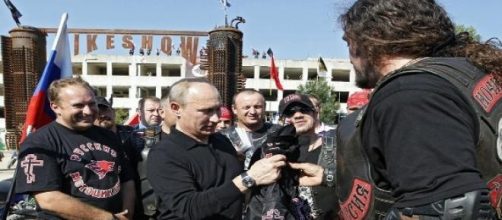The Polish government has declared that it will refuse entry to an extreme nationalist Russian motorcycle gang who had intended to commemorate the Soviet Union's victory over Nazi Germany 70 years ago by riding from Moscow to Berlin. The pro-government 'Night Wolves' group, which was founded in 1989 and has a membership of approximately 5,000, has expressed their desire to recreate the Red Army's westward push during the latter stages of World War II by passing through Belarus, Poland, the Czech Republic, Slovakia and Austria before finally reaching the German capital in triumph by 8 May.
The bikers departed from Russia on Saturday and crossed into neighbouring Belarus without issue, but Polish authorities have made it clear that they are not welcome in their territory. Border guard spokesman Dariusz Sienicki announced that "These people will not cross into Poland. Each of them will individually receive a decision denying them entry into Poland's territory." Polish Prime Minister Ewa Kopacz went as far as to call the actions of the group a "provocation", a view which is shared by many people throughout Poland who are deeply suspicious of the actions of any organisation linked to the Russian government.
Last year, following the annexation of the Crimean peninsula, the Night Wolves made their way down to Russia's newest territory in a display of nationalistic force and solidarity. Numerous members have also proudly fought with the pro-Russian separatists in the ongoing conflict in the east of Ukraine. Additionally, Russian President Vladimir Putin himself has been photographed giving speeches to the group in the past and has even been seen riding alongside them. These factors have led to the organisation being blacklisted by the United States, a move which coincided with broader economic sanctions brought against the Russian government following the Ukraine crisis.
German authorities have also expressed their disapproval of the bikers' plan and have said that they will try to stop any attempt by the club to enter the country, even though some members already have the appropriate visas to visit Germany. "We deeply treasure freedom of speech and freedom of assembly in Germany, but we've decided that some of the leaders in the Night Wolves are not pursuing legitimate aims with these plans." said foreign ministry spokesman Martin Schaefer. He then pointed to the group's support for Crimea's annexation as concrete proof of these non-legitimate aims.
The Night Wolves themselves remain undeterred by these hindrances, with their leader Alexander Zaldostanov remaining resolute in his desire to carry out the group's goal. The publicity gained from their trip thus far has ensured that the presence of Russian nationalism is being felt within the heart of Europe.
© ALL RIGHTS RESERVED

